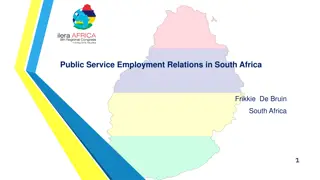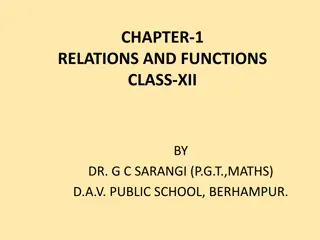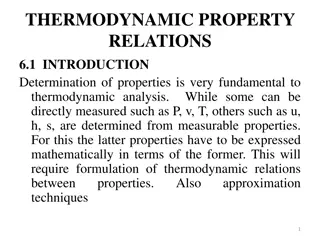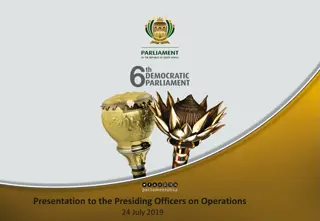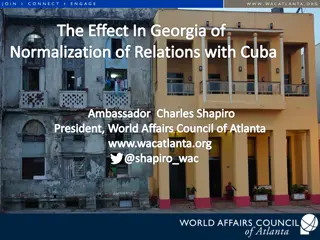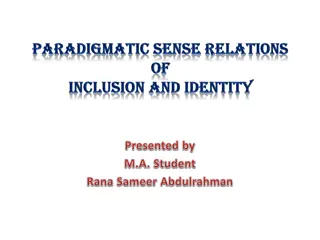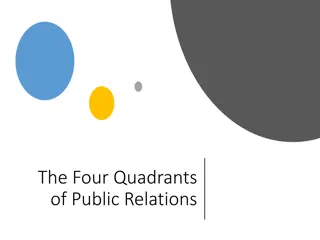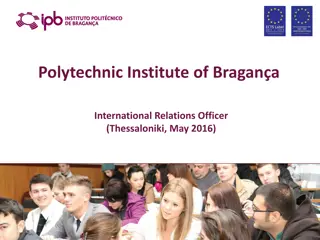Theories of International Relations Overview
The field of International Relations (IR) encompasses various theories that seek to explain global phenomena, drawing from disciplines like history, philosophy, and economics. Theory, derived from contemplation and speculation, organizes ideas to explain issues such as state emergence, conflict causes, and foreign policies. Positivism and post-positivism debate the attainability of objective knowledge in social sciences. The emergence of IR theory was influenced by events like WWII, the Great Depression, and the rise of dictatorships. Explore the nexus between the First World War and IR theory, understand positivism, and differentiate between theory and ideology.
Download Presentation

Please find below an Image/Link to download the presentation.
The content on the website is provided AS IS for your information and personal use only. It may not be sold, licensed, or shared on other websites without obtaining consent from the author. Download presentation by click this link. If you encounter any issues during the download, it is possible that the publisher has removed the file from their server.
E N D
Presentation Transcript
Theories of International Relations All understanding or explaining some aspect of the world, although they do so in very different ways. And they are all underpinned by bodies of theory formulated in response to particular problems or questions emerging from their particular subject matter. The study of international relations (IR), and its theorization, is a species of political studies or political science but has developed its own distinctive profile since it emerged as a specialized field almost a century ago. IR also draws on other disciplines in the humanities and social sciences, especially history, philosophy, law and economics, with social theory having a particular influence in recent years. academic disciplines are dedicated to the task of
What is Theory? Theory derived from the Greek theoria, meaning contemplation or speculation. It may be defined as an organized system of ideas devised to explain a certain set of phenomena. These phenomena may include: Emergence and formation of states Cause(s) of wars and conflict Foreign policy thrusts (Levels of Analysis) Reasons for climate change Feminism (Gender Studies) Governmental system (authoritarianism, Democracy) Development and underdevelopment in the world (Capitalism and Socialism/Marxism) Terrorism and insurgency (religious fundamentalism) Cooperation, etc
Positivism and Post-positivism *Those subscribing to a positivist epistemology will claim that objective, value-free, positive knowledge is possible in both the natural and social sciences. But this follows if, and only if, a proper scientific method is pursued. However, the post-positivist claim that only the natural sciences can produce such knowledge, insisting that objective knowledge in social science unlike in natural sciences, is simply unattainable.
The Emergence of International Relations Theory Events leading to the emergence of International Relations First World War Great Depression of the 1930s Emergence of dictatorship in Europe (Fascism and Nazism) Japanese militarism Widespread use of economic protectionism Virulent nationalism Woodrow Wilson s thesis leading to Liberal Institutionalism (Idealism/utopianism)
Questions and responses Critically explain the nexus between the outbreak of First World War and emergence of International Relations theory What do you understand by the term positivism ? What is the difference, if any, between a theory and an ideology?
The Realist Theory It is commonly called: Realism Realpolitik Power Politics Realist Perspective Power Politics School
Introduction The tenets of realism go back several centuries and appear to many over time as eternal truths We see much commonality in both ancient and modern thinking about international relations Modern diplomatic relations whether at bilateral of multilateral levels is often based on realism Some realists and realist scholars include: Sun Tzu (Ancient China), Thucydides (Ancient Greece), Machiavelli (Medieval Italy), Thomas Hobbes (Civil war-torn England), Mao Tse/Chairman Mao (Communist China) and Hans J. Morgenthau (USA 1950s). The have all come to similar conclusion about the characteristics of the global system that can be grouped together as the theory of realism.
Main Assumptions of Theory of Realism States are most important actors within the international system International system is anarchic and conflict prone No recognition of authorities of extra-state (such as international organizations) body All states must pursue power to survive Military power is ultimate form of defence (state without military power is inviting war) Morality has no place in international politics (It does not recognise international law) International politics more important than domestic politics Military alliance formation (collective security arrangement)
Why do Realists claim that states must pursue power or that morality has no place in world politics? The world is anarchic and it is based on a self-help system To survive, states must pursue power. Also, if there is no higher authority, then there is no international law that states must abide by. If you want perpetual peace, you must always prepare for war Lack of military power encourages aggression from the belligerent nations UN and other regional organisations are more or less toothless bulldog.
Why is international politics seen as more important than domestic politics by realists? If you do not take care of international politics, there may no longer be any domestic politics; this is a point made by the Italian realist, Niccolo Machiavelli Domestic politics is only important to the extent that it strengthens or weakens a state. Also, since states are essentially the same, domestic regime type and institutions do not matter much for world politics Globalisation and international trade make vitally important in the modern international system (Covid-19 and Russian-Ukraine war).
Anarchy makes conflict in the system inevitable. Realists understand the implications of this, forcing states to compete against each other in a self-help system. To survive, states must try to increase their power by: Internal development Conquest Alliance formation for balancing (Balance of power) Question: Exhaustively analyse the importance of Balance of power in the modern interstates relations. Cite valid example to support your argument.
Power and International Political System A central concept in International Relations It is the ability to influence the behaviour of other states without allowing them to do same to you Level of power affects state strategies and outcomes of various contests (military conflicts, economic conflicts, and other negotiations Power is both built on tangible (hard power) and intangible (soft power) attributes Power leads to influence. Power helps a country win international contests The concept is often used by diplomats and analysts to compare countries (Superpower, Great powers, Medium powers, lesser powers) We also have regional power, e.g, Nigeria and Ghana in West Africa, Germany, France and England in Western Europe.
Attributes or Elements of Power Military capability Size of economy (GDP) Sophistication of economy and technology Quality population Geographical location Patriotism Quality of diplomacy Natural resources Food sufficiency High level of military preparedness and the political will to use military power
What makes some countries superpowers? Superpowers are very strong countries that can project their power around the world By power projection, we mean the ability to deploy troops around the world as well as deliver a full-scale nuclear attack Such capabilities require a sophisticated economy and society. Currently, only the United States can be classified as a superpower The former Soviet Union was a Superpower until its collapse in 1990 which greatly eroded Russia s ability to swiftly defeat Ukraine
Rationality and Decision-making Assumption that actors are rational Actors must known what is in their best interests (State interest). Compare Buhari s national interests and George v s action during the WW2 Actors know how to maximise utility Choose ranked options that maximise utility In international relations, states are often assumed to be unitary rational actors.
Rationality and Realism To realists, rationality means to values short-term over long-term calculations due to insecurity Value Relative gains over Absolute gains: *Absolute gains both sides in a relationship gain something *Relative gains both sides gain something but one actor gains more
Balance of Power To deter aggression by others, state balance against each other so no one country can become too strong Realists typically focus on the balance of power, which may be regional or sometimes used to discuss a dyad of two countries The Concept of Europe that emerged after the Napoleonic Wars is a good example Problem: The balance of power seems bound to fail in the long-run and could be said to only war. Some realists would disagree. Realists believe that power imbalance lead to war since powerful states, unchecked, will try to acquire more power. Balancing by forming alliances with other states is the quickest way to check the power of potentially aggressive states.
Neo-Realism Why reform Realism Neo-realism (Waltz) borrows many of the traditional assumptions of Realism. Realism: System structure dictates the environment of international interactions Neo-Realism: System structure is determined by polarity (number of major powers). Realism: States are mostly defensive in nature Neo-Realism: Bipolarity systems are mire stable than multi-polar system. Question: To what extent would you agree with the Neo-realist s assertion that bipolarity facilitates more stable international system than multipolarity? Support your analysis with germane examples
What do you think about Realism? Relevant or accurate? Logical? Assumptions useful? Role of domestic politics? Morality? Does anarchy really make conflict inevitable
Questions and Responses Discuss the notion that the Hegemonic Stability is crucial to the attainment of the world peace.
Liberalism: Key Assumptions Robert Keohane and Joseph Nye, Power and Interdependence: World Politics in Transition (1977) States are not the only important actors in world politics.Non-state actors are important entities in IR that cannot be ignored. International Organizations (IOs) can be independent actors in their own right. The organization s own decision makers, bureaucrats have considerable influence in agenda setting, namely determining which issues are most important politically. IOs are more than simply arenas within which sovereign states compete. Moreover, Multinational Corporations like General Motors, DaimlerChrysler, Toyota Motor, Ford Motor or Phillips cannot be ignored as well in a highly interdependent world economy.
Second Assumptions of Liberalism For liberals, the state is not a unitary actor. State is composed of individual bureaucracies, interest groups, and individuals that attempt to influence foreign policy. There may be competition, coalition, conflict, compromise among these actors. To speak of a foreign policy of Turkey, US or UK means that foreign policy decisions were determined by competition among a number of actors. Foreign policy preferences reflect the multiple actors within the state. Liberals break the state into various components, they reject the notion of the state as an integrated entity. They reject the idea that the agenda of international politics is dominated primarily by military-security issues. For them the agenda of international politics is extensive and diversified and economic and social issues are often at the forefront of foreign policy debates. The problems of energy, natural resources, environment, pollution are as important as questions of security and territorial competition.
Contd Domestic actors influence how states define their foreign policy interests Societal actors compete with each other for access to and influence upon decision- makers National decision-makers are responsive to interest group lobbying Both governmental and non governmental actors may take actions that are contrary to the preferences of central state authorities. For liberals such an interaction not only happens within the state but across national borders, so it has a transnational dimension. States may not be rational actors: A particular policy may be suggested just because it serves bureaucratic power or prestige of certain groups. Moreover, misperception of decision makers as a result of incomplete information, bias, and uncertainty is also a key focus of attention for liberal scholars. The international system is not completely anarchic. Some domains of international relations are characterized by international regimes . So, cooperation between states can be achieved.
Basic Concepts and Issues in Liberal Theory: Liberals focus on norms, regimes, economic interdependence, international organisations no distinction between high politics (high-level relations between states) and low politics (internal socio-economic issues) ssues of terrorism, drug trafficking, human rights, environment, technology and finance are as important as security issues
Evolution of Liberalism - Enlightenment period liberalism (liberal universalism) - Idealism that emerged after First World War - Institutional Liberalism
Peaceful Liberal Values Rational individual, Republican/democratic state, commercial interdependence, universal rights, international law, international institutions peaceful world order Cosmopolitan morality could be achieved through the exercise of reason and through the creation of democratic states. The development of the idea of Republican state and free trade central to the Liberal values.
Focus on the Individual John Locke (1632-1704) emphasizes that all individuals have rights such as freedom, equality, property, and right for living. A state is responsible for protecting these rights. Immanuel Kant (1724-1804) in his work Perpetual Peace : A peace federation based on the rational individual and Republican government can be created. According to Kant; Peace can be achieved through 3 steps: 1. Human rationality: rational individuals having moral values create peaceful society thus a peaceful world. 2. Constitution Based Republican state: as all individuals are rational, they know that they will bear the costs of a war. In a republican state they can prevent their leaders from going to war. The rule of law, separation of legislation, executive, and judiciary. Respecting each other s rights and freedom 3. Spreading human rationality, free trade and republicanism worldwide: perpetual peace.
The Importance of Free Trade Free trade brings people from different race, religion and language together. Protectionist economic policies lead to insecurity and also low level of interaction among states Borders that separate states should be transcended and common values should be created. Free trade is essential in creating these common values It is believed that market societies are against war.
Contd For creating wealth for the world, there should be increase in production. This will satisfy human needs and prevent evil intentions of individuals. International distribution of wealth can be equal if individuals freely pursue their interests all around the world. The increase in production and equal distribution of wealth depend on a free international trade. If all states try to maximize their economic interests, then whole world will benefit from it. Global wealth will lead to global peace.
Idealism/Liberalism Unlike the classical liberalism which argues that if individuals pursue their self-interests, societal harmony will be achieved, idealism argues that state intervention is necessary for creating societal harmony. States must be part of an international organization and be subject to its rules and norms. Idealism has an active and regulatory character. It suggests that wars like first world war should not be experienced again. So, idealism suggests that international peace should be achieved through cooperation between democratic states and the commonsense of the people. The League of Nations was founded in 1920 to maintain peace and stability, but its collective security system failed to solve the economic and political crises of the 1930s.
Idealism and Woodrow Wilson principles Establishment of an international organization The right to determine each nation s own destiny Mutual respect for each state s independence Resolution of problems through diplomacy Removal of customs tariffs and strengthening mutual trade between states Spreading economic liberalization
How to Avoid War The spread of economic relations between states makes war costly. Because states have common interests due to mutual economic interdependence. In order not to lose their interests, states avoid from war. Establishment of democratic states. Democracy should be preferred instead of monarchy, free trade instead of protectionism, common security instead of balance of power Focus on individual rights and economic welfare avoids war. Rational individuals create harmonious societies which in turn create international peace.
David Mitrany and Functionalist Theory of Integration David Mitrany (1888-1975) argued that greater transnational interdependence between countries can lead to peace. He argued that cooperation should be arranged by technical experts, not by politicians. The experts can find better solutions to common problems in areas such as communication, finance, transport... When people realize that they benefit from cooperation, the cooperation that starts in functional areas can expand to other areas. Economic interdependence can lead to political integration and peace.
Democratic Peace Theory Bruce Russet and Michael Doylereject that war is caused by bad people (human nature) or the absence of a central authority (anarchy). For them, regime-type is important. Democracies do not fight each other. Following Immanuel Kant, Michael Doyle highlights that citizens in general will oppose wars because: - the existence of domestic political cultures based on peaceful conflict resolution - democratic governments are controlled by their citizens, who will oppose war because they do not want to bear the costs of wars. Governments, being rational actors, avoid starting wars in order to maximise their chances of success on election day Germany s opposition to the war in Iraq might be explained in terms of Chancellor Schroder s opportunistic reading of domestic public opinion. The stance of Germany public opinion is consistent with the belief that citizens are generally war-averse.
Critique of Liberalism/Idealism It is utopian in nature It is impracticable given the competing interests of nations. Most states outside Western Europe, still rigidly subscribe to the Westphalian model of state system/sovereignty (Border closures). Marxist scholars criticize liberals for modelling a rich man s world interdependence limited to the developed West in the rest of the world, dependence of one group of countries upon another reflected global imbalances in wealth and power
Hegemonic Stability Theory: The Liberal Perspective A hegemonic power is a key in establishing most of the existing regimes (especially in International Political Economy): a hegemon is a state that has willingness and the ability to establish rules of action in the international sphere and enforce them The US has acted as a hegemon after the Second World War By 1980s, its hegemonic power has declined in recent times. Can cooperation continue after hegemony? From a liberal perspective, cooperation can continue even in the absence of a hegemon.
The US Hegemony and Its Liberal Character in Post WW2 John Ikenberry: The US put certain liberal principles into the regulatory rules and institutions of international society. Contrary to realist thinking, the US forsake short-run gains in return for a durable settlement that benefited all states. The US advocated a global free trade regime as they believed that free trade brings benefits to all participants. The US created important international institutions that constrained its actions. Ex: Bretton Woods Institutions (IMF, World Bank, WTO) for regulating economic order and NATO for ensuring security alliance. Advocates of this liberal hegemonic order note that it was so successful that allies were more worried about the abandonment of the US than its domination. In terms of American hegemony, in the absence of a major war or global economic collapse, the existing order prevails. The post-1945 international order has been successful and durable because US hegemony has a liberal character.
Questions and responses from the students Practicing Questions: To what extent would you agree with the assertion that Idealism has no relevance in contemporary international politics ?
Democratic Peace Theory The quest for peace, harmony, stability and development within the international system
Introduction: Assumptions of democracy and democratic governance Separation Of Powers, Checks and Balances, Representative Systems, Independence of Judiciary, Supremacy of the Constitution, Constitutionalism, Equality before the law, Fundamental Human Rights and Rule of Law (Foundation Of Peace) Democracies Fulfill These Requirements The Best
Empirical Findings There is usually no war between democracies The more democratic the international system, the more peaceful the world. Democracies fight (almost as often as autocracies) Democracy facilitates economic development than autocracy (This is very contentious): due to: Market-oriented value Respect for fundamental freedom and rights Transparency and accountability of the governance system Full operation of capitalist economic ideology
The Democratic Peace Theory: Empirical Regularities: 1. Democracies are nearly immune from wars with one another (ma0z/russet) 2. Democracies not all immune from fighting wars with nondemocracies(maoz, abdoliali) 3. Demoracies win a bigger share of the wars they fight lake/raiter, stam). 4. Democracies dyads chose more peaceful processes of dispute settlement than other other systems of governance (Dixon/mouseau/raymond) 5. Larger democracies seem more constrained to avoid wars than smaller one (MORGAN, CAMPBELL)
How to Explain those Regularities Normative explanations: common values role of citizens: *Rallies, protests, public opinions *What about covert operations by the democratic governments? wars are not electorally popular in democracy democratic leaders allocate more resources on war effort than autocracies.
Contd Democratic leaders seek valid legitimacy for their war efforts they require large winning coalitions they only fight if they anticipate victory (they are more rational in strategic thinking) they are adept in utilising sanctions against their enemies: wars are the last resort war between democracies is not impossible, but the condition under which a democrat will attack another democrat are more restrictive than the condition under which a democrat will attack an autocrat. Autocrats always are the more attractive targets. To democrat, enlargement of democracy would translate to more peaceful global environment.
Nuggets of the Democratic Peace Theory Democracies are peaceful due to shared interests, Consider the events during the cold war (Farber and Gowa). War and democracy are rare, so it not surprising that democracies have not fought each other (Spiro).
Practicing Questions and Responses Given the assumption of the Democratic Peace Theory that democracies rarely fight each other, how would you explain the frosty relations between the United States and Russia in contemporary international system? To what extent would you subscribe to the contention that democracy rather than autocracy does a better job in facilitating economic development. Cite relevant examples to buttress your argument. How apt is the view that the enlargement of democratic space would result in more stability and peace within the international system?







